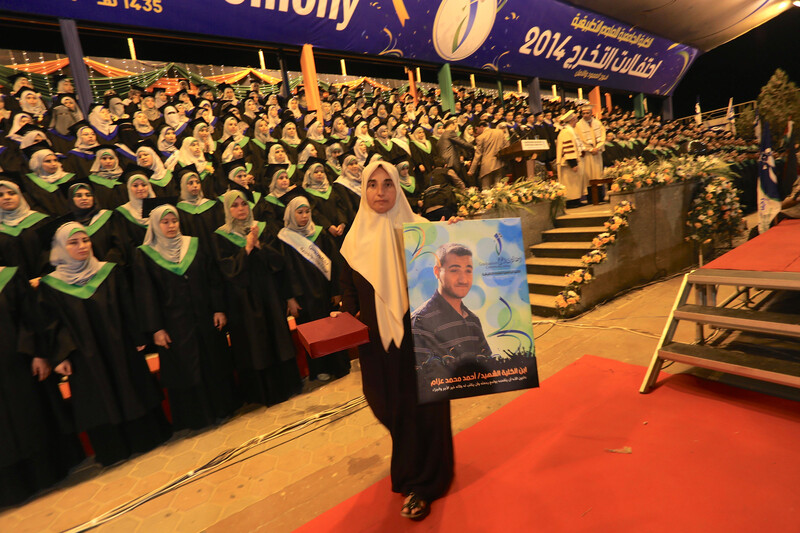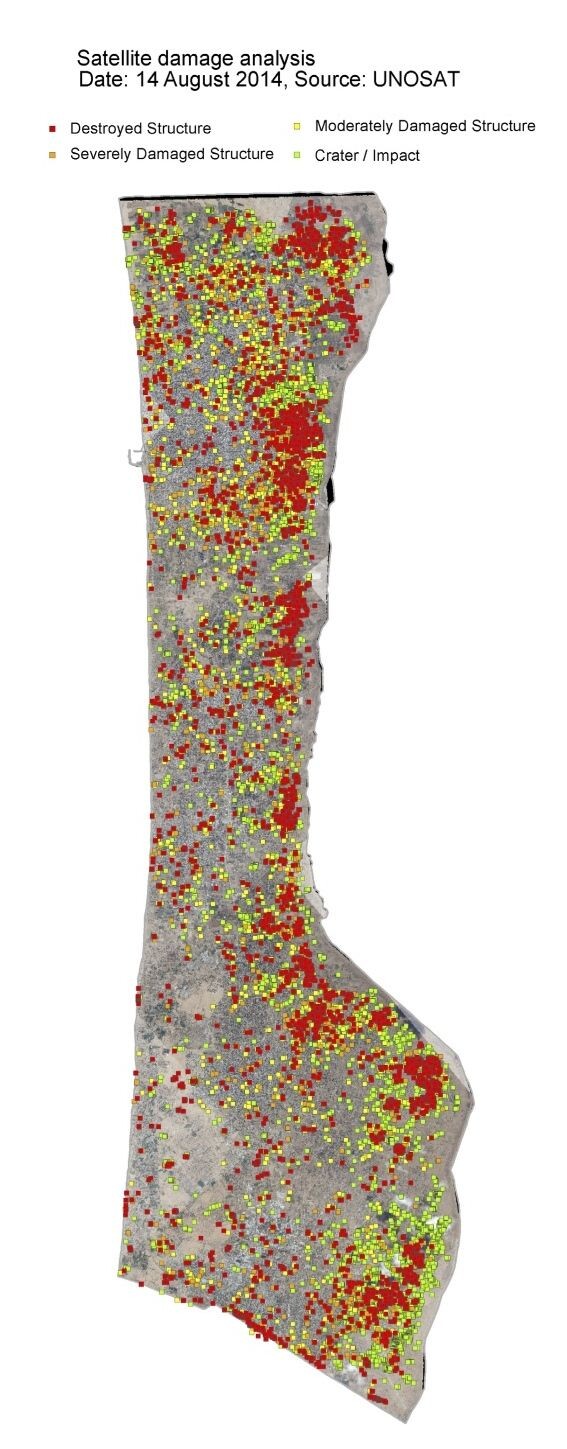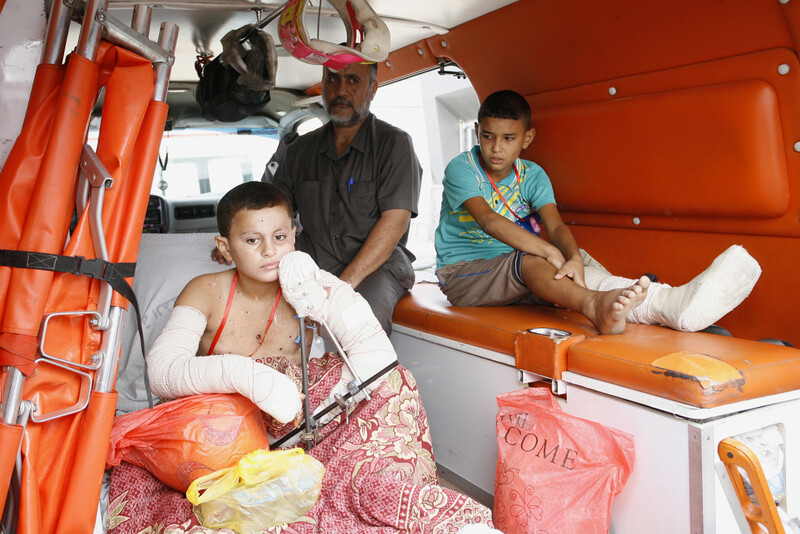Rights and Accountability 10 September 2014

A Palestinian mother carries the image of her son who was killed during the Israeli assault on Gaza during a graduation ceremony at the University College of Applied Sciences in Gaza City on 8 September.
APA imagesA new United Nations assessment published this week lays out the massive scope of the needs facing the nearly 1.8 million Palestinians in Gaza following the “unprecedented” destruction wreaked by 51 days of Israeli bombing in July and August.
Israel’s assault – which it dubbed “Operation Protective Edge” – left at least 2,133 Palestinians dead and more than eleven thousand injured. More than 100,000 are permanently homeless as some 13 percent of Gaza’s housing stock – 44,300 housing units – was affected by the attack, with five percent rendered completely uninhabitable.
The UN report “Gaza Initial Rapid Assessment,” published by the Office for the Coordination of Humanitarian Affairs (UN OCHA), was conducted through August with the assistance of dozens of Palestinian and international aid agencies, organizations and experts.

Destruction everywhere
UN Office for the Coordination of Humanitarian AffairsIt indicates that almost everyone in every part of Gaza faces some urgent need for basic protection, healthcare and rehabilitation, housing, water, food security or education.
The report came out the same day that the UN and the Palestinian Authority launched a $551 million emergency appeal to meet urgent humanitarian needs in Gaza.
The assessment also identifies the need for “legal support to address some of these protection needs, including pursuing accountability for alleged violations of international law resulting in deaths and injuries, as well as destruction of property as a result of the military operation.”
The siege is still the issue
These findings underscore the urgency of the call made by Palestinians in Gaza and human rights and humanitarian groups insistently: reconstruction, recovery and a normal, dignified life are impossible unless the siege is lifted.
There is a strong consensus in the international humanitarian aid industry that the siege must go.
“Only a full opening of all crossings to people and goods, including exports will enable Palestinian civilians in Gaza to restore their economy and escape the poverty the blockade has entrenched,” Oxfam has said. “The international community must press Israel for the blockade to be fully lifted, rather than only eased.”
And the International Committee of the Red Cross has long viewed the siege of Gaza as illegal collective punishment.
But since the 26 August ceasefire, uncertainty and mystery continue to shroud the understandings regarding the movement of goods and people in and out of Gaza reached by Israel and Palestinian resistance organizations.
Although the ceasefire understandings were not made public, media reported that they “include opening all crossings to Gaza, allowing reconstruction of damaged infrastructure, allowing the entry of materials needed for reconstruction and permitting fishing for a distance of six to twelve nautical miles from shore.”
The parties to the deal also agreed to return to Cairo within a month to resume negotiations on a long-term truce. Those discussions have yet to begin, but a Hamas official said they would start in mid-September.
Little change at the crossings
What we do know is that the Rafah crossing for people between Egypt and Gaza continues to operate at very reduced capacity, and the Kerem Shalom crossing between Israel and Gaza remains the only goods crossing open.
Palestinian sources have told Gisha, an Israeli nonprofit organization that monitors and advocates for an end to the movement restrictions on Gaza, that there has been a slight easing of restrictions at Erez, the crossing for people between Israel and the Gaza Strip.

Palestinian children wounded during the Israeli assault on Gaza wait for permission to cross into Egypt at the Rafah border crossing, 8 September.
APA imagesBut in a post on its website today, Gisha says that such “fragments of information, the result of understandings that brought Operation Protective Edge to an end, serve only to remind us that critical decisions are being kept hidden from the Israeli and Palestinian public.”
Gisha points out that Erez, Kerem Shalom and Rafah “were technically ‘open’ before the fighting began, and, for the most part, while it was taking place.” Gisha explains (emphasis in original):
It isn’t about opening the crossings – it’s about who and what can move through them and in which directions. The media reported that the quotas for travel through Erez Crossing would be increased, but failed to mention that there were no quotas at Erez to begin with, except those governing travel for “merchants” (a slightly deceiving title for individuals who are mainly involved in the purchase of goods that are brought into Gaza), and that the problem with travel isn’t just with the number of people traveling, but rather the strict criteria that determine who is entitled to travel.
There was also talk of freer flow of goods through Kerem Shalom Crossing, but getting in more goods that are already permitted to enter won’t solve the problem. The focus should be on lifting restrictions on entrance of now very-badly-needed construction materials to Gaza, including the total prohibition on selling these to the private sector. “Freer flow” of goods must also include transport of Gaza-made and grown goods out of Gaza to its once primary markets in the West Bank and Israel.
For several years, Israel has effectively banned all imports out of Gaza. Last month Gisha published a position paper calling for an end to the “civilian closure” of Gaza and the policy of separation between Gaza and the occupied West Bank. The paper states:
Lifting the closure would make normal life possible: students from Gaza would be able to study in universities in the West Bank; construction workers would be able to make a living and rehabilitate Gaza; individuals would be able to reunite with relatives they have not seen for years, businessmen and women would be able to develop their businesses and access professional opportunities; farmers would be able to sell their produce and provide for their families. Improving conditions for the civilian population in Gaza does not necessitate compromising Israel’s security needs. On the contrary, in the long run, it is the only way to achieve sustainable security in the region.
In today’s statement, Gisha says that “Top military and defense ministry officials” in Israel “have acknowledged the urgent need for rebuilding in Gaza,” but so far there is not much sign of change.
“The delicate calm of the present has to be reinforced by a more long-term approach that would ensure the fighting doesn’t resume and gives real hope for a sustainable future,” Gisha says. But, the group argues, this fragile calm is jeopardized by the uncertainty over the crossings:
The understandings that compose the ceasefire agreement must not remain shrouded in secrecy and known only to a select few – they affect the lives of each and every one of us. We have a right to know what has been agreed and what is being negotiated. The negotiating parties have a duty to report to the public, which sent them to stop the killing and destruction and forge a better path forward.
No foregone conclusion
What I take away from this is that an end to the siege, or even a substantial easing of the prison regime Israel imposes on Gaza, is not a foregone conclusion.
Gaza has dropped out of world headlines – despite the scale of the ongoing human catastrophe there, the BBC, for instance, effectively has a news blackout on the situation in Gaza.
The so-called “international community,” which has never been keen to put pressure on Israel, is now preoccupied by the renewed American-led war effort in Iraq and Syria.
Absent international pressure, Israeli politicians, egged on by a hardline public, will likely remain rejectionist about ending the siege.
Meanwhile, the fragile front of Palestinian “national unity” is threatened by the increasingly unhinged statements of Palestinian Authority de facto leader Mahmoud Abbas, who continues to treat the Palestinian resistance as his enemy, while maintaining his “sacred” collaboration with the Israeli army that devastated Gaza.
As the Palestine Papers revealed four years ago, the Abbas-run Western-backed Palestinian Authority supported the siege of Gaza from the beginning. Abbas’ continuing sabotage can only weaken the Palestinian position in advance of the Cairo talks.
For the global Palestine solidarity movement, the message is clear: heed the calls from Palestinians in Gaza to maintain and escalate campaigns directed at Israel and its sponsors as well as at Egypt to end the siege once and for all.





Comments
GAZA
Permalink Linda Morrison replied on
I am ashamed for the world, that they let this so called civilised state steal land, murder children, commit genocide and the pathetic, comatose corrupt, paid for, greedy, bottom feeding politicians of this so called free, democratic...what the hell do I tell my children the definition of democratic is? corrupt, disgusting, needless murdering, spineless, piece of shit! my family has fought for generations for the country of the UK I trace my ancestry back to way before 1600 and my countries government absolutely disgusts me. I am disgusted with the UNITED KINGDOM and AMERICA you have lost your way and your soul.
A lesson for us all...
Permalink Tujays replied on
The suffering inflicted on the Palestinian people by the Israeli’s is so abhorrently wrong it amazes me that people are still willing to turn a blind eye to it. Israel’s brutal occupation (as enabled by the U.S.) can’t be justified by anyone unless they’re full-on-racist and sociopathic.
Those who condone Israel’s actions will one day be held accountable; if not by a higher power, then at least by history. Shills like Obama, Warren, and Sanders (and all the other miscreant PEPs) will be remembered for their despicable cowardice in the face of one of humanities greatest injustices. How they can look themselves in the mirror each morning without retching is beyond me.
I have the most profound respect for Ali, Rania, Max, and Glenn. You all are providing a huge service to the world by giving voice to the Palestinians. I’m grateful that you are here to remind us there is nobility and good on earth…because there’s so much evil in the world right now.
Whenever I feel pessimistic I think of the perseverance of Palestinian people and how brave and resilient they are in spite of ongoing trauma. Because of that bravery, we owe them our hope and continued efforts so that they will soon be free from their oppression.
This is as much about the corruption and racism in the west as it is about Zionism in the east (which is inherently racist by definition). We all play a part in it. As individuals, we need to speak out so that we collectively evolve out from under our current state of moral, ethical, emotional, spiritual, and intellectual blindness.
Israeli duplicity, lies and treachery
Permalink John Yates replied on
Israel has no ( and never did have any) intention of lifting or even easing the blockade of Gaza, nor do they have any intention to make any move towards a solution at the "talks" in Cairo. Israeli duplicity, lies and treachery are believed by the "west" as indications of "good faith" by Tel Aviv and the Israeli aggressor is allowed to get away with genocide again.
Palestinians have only the options of resistance and struggle against the occupier.
Lift the blockade of Gaza. End the occupation and free Palestine.
Gaza
Permalink Sean Breathnach replied on
"The Holocaust makes Israelis think international law doesn't apply to them." Interesting article in yesterday's Irish Times, by Lara Marlowe.
www.irishtimes.com/.../holocau......
Palestinian Leadership
Permalink Michael replied on
I agree with you on many levels in that Israel has broken international law, continues to facilitate human rights violations, and is likely culpable for many war crimes. However, as a journalist, how can you try to paint an accurate picture of the crisis without mentioning the rockets fired from Gaza on Israeli civilians, and that Hamas calls for the destruction of Israel in its charter? To clarify, I am not using these facts to justify Israeli actions, and the bloodshed is obviously disproportionate, but these facts need to be discussed to. Don't these factors make a "hardline public" inevitable?
Rockets.
Permalink Sean Breathnach replied on
Michael, if you could take the time to view this video on YouTube, it might answer your questions on the rockets fired from Gaza and the Hamas calls for the destruction of Israel.
http://www.youtube.com/watch?v...
Noam Chomsky (Aug 7, 2014) "Much Worse Than Apartheid"
Israeli duplicity, lies and treachery
Permalink John Yates replied on
Within the space of 2000 characters it is impossible to comment on anything other than the main point of "waiting for the siege to end". Your comment on rockets is valid but is symptomatic of resistance to an occupation of Palestine dating back to 1967 and even beyond. If Ei will permit you may care to visit my blogg http://new-agenda2012.blogspot... and link to Gaza,Israel,Palestine, amongst others for my comment/interpretation of events in Palestine and the on going occupation.